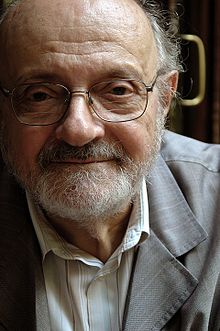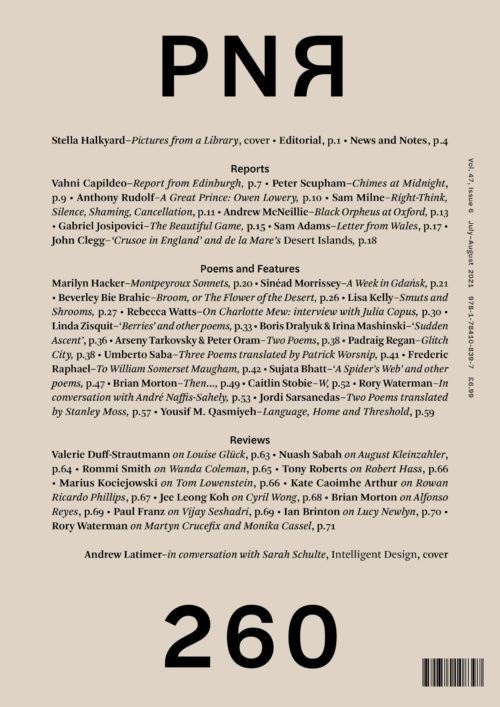It neighs through small farms and hills.September is the name of this horse.See its eyeclear the sharp horizon,ripen the mountains.Its hair scatters sun-pollenover red clay.September is the name of this horse.Up to the main square through the streets,were today a holiday (it is not),the people of the neighborhood would see it pass,jobs know suddenly they become treesin the peace of a high garden.On balconies the palms of last Easterare suddenly disheveled and silent clouds go galloping by.Gallant crops of summer,trail feathersand Finch and Partridge,a full flock of leavessweep the skin of the road,whose cat jumps to a roofand claws the shadows of leaves.The sun whinnies.The little horsemerry-go-round,blond and black and round,up and down,down you comeone after one.September,now the night the most secret of lights.The gust of grey sea on the window,The gust of forests in the town.Scandinavian long ships haul golden leavesthey will pulp to save and praisetheir tree gods in winter.
September
Feature Date
- January 27, 2022
Series
- Translation
Selected By
Share This Poem
Print This Poem
Reprinted from PN Review July/August 2021 and with kind permission of Carcanet Press, Manchester, UK.
English Copyright © 2021 by Stanley Moss.
All rights reserved.
Reproduced by Poetry Daily with permission.

Jordi Sarsanedas (1924 – 2006) was a Catalan poet, devout Catholic, anti-fascist, French academy chair during Franco days, later cultural minister of Catalonia, and dean of the Catalan Institute of Letters. His collected poems are Cor Meu, el Món (My Heart, the World). He ran an anti-fascist literary underground Review in Franco days. At a convention in Paris in 1953, Franco exhibited his Review.

Born in New York City, Stanley Moss was educated at Trinity College and Yale University. He has been writing poetry for over a half-century. In addition, Moss is a private art dealer specializing in Italian and Spanish old masters, as well as the publisher and editor of The Sheep Meadow Press, a non-profit publishing house devoted to poetry. Moss lives on a farm in Clinton Corners, New York. His first book of poems, The Wrong Angel, was published in 1966, and since then he has also published The Skull of Adam (1979), The Intelligence of Clouds (1989), Asleep in the Garden (1997), A History of Color (2003), Songs of Imperfection (2005), New and Selected Poems (2006), Rejoicing (2009), God Breaketh Not All Men’s Hearts Alike (2011), No Tear is Commonplace (2013) and It’s About Time (2015). Since 2015 Moss has published Almost Complete Poems (Seven Stories Press, 2016), Almost Complete Poems (Carcanet 2017), Abandoned Poems (Seven Stories Press, 2018), God Breaketh Not All Men’s Heart’s Alike: New and Selected Poems (1948-2019) (Carcanet, 2019), Act V, Scene I (Seven Stories Press, 2020), Not Yet: Asian Poems and Poems Seasoned with Chinese Experience (Seven Stories Press, 2021), and Always Alwaysland, which will be published by Seven Stories Press in June of 2022. His poems are published in the U.S.A. by Seven Stories Press, distributed by Random House, and have been published in German (tr. by Hans Magnus Enzensberger) and in Chinese (tr. by Fu Hao), with translations in Spanish, Italian, and Romanian on the way.

6
Manchester
England
General Editor
Michael Schmidt
Deputy Editor
Andrew Lattimer
Through all its twists and turns, responding to social, technological and cultural change, PN Review has stayed the course. While writers of moment, poets and critics, essayists and memoirists, and of course readers, keep finding their way to the glass house, and people keep throwing stones, it will have a place.
“It has […] attempted to take poetry out of the backwaters of intellectual life and to find in it again the crucial index of cultural health. In so doing it has often succeeded in broadening the horizons of our view of twentieth-century poetry and in encouraging poets to be ambitious about their concerns.”
—Cairns Craig, Times Literary Supplement
“…probably the most informative and entertaining poetry journal in the English-speaking world.”
—John Ashbery
“…the premier British poetry journal. Its coverage is broad and generous: from John Ashbery to new young English poets, from essays on Continental poetics and fiction to reviews of neglected poets both living and dead. At a time when poetry is largely neglected, [it] continues to make an eloquent case for its centrality to our culture.”
—Marjorie Perloff
Poetry Daily Depends on You
With your support, we make reading the best contemporary poetry a treasured daily experience. Consider a contribution today.



